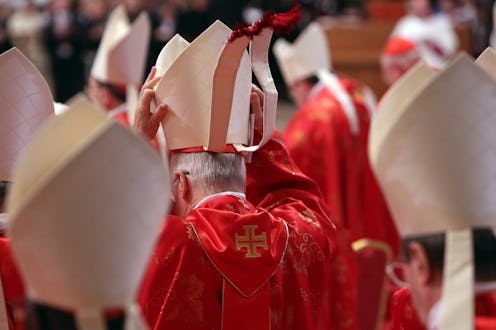News
Catholic Leaders Want Parents To Stop Their Trans Kids From Being Themselves

Catholicism rarely doesn't have an opinion on something — and based on an open letter written by Catholic bishops to parents of transgender kids, gender identity is no exception. On Friday, the United States Conference on Catholic Bishops released a message reiterating an idea that's not unfamiliar to those who have grown up in traditional churches:
We come together to join our voices on a more fundamental precept of our shared existence, namely, that human beings are male or female and that the socio-cultural reality of gender cannot be separated from one's sex as male or female.
"Children especially are harmed when they are told that they can 'change' their sex," the letter reads. And though it essentially suggests parents should reject their transgender children's identity, it also encourages the Catholic community to "respond to those wrestling with this challenge with patience and love."
Not every member of the Catholic Church agrees on matters concerning gender identity. But this open letter has certainly made it clear that its most powerful leaders adhere to a traditional view of sexuality and gender. Namely, the authors of the letter pushed the idea that "God created mankind in his image; in the image of God he created them; male and female he created them," as one verse in Genesis states.
Of course, the concept of a strictly defined gender binary is not the only tenet of traditional Catholicism that's been disputed at one point or another. As Ryan Thoreson, a researcher at Human Rights Watch, pointed out, the Catholic church also believes in transubstantiation (the idea that bread and wine can become the body and blood of Christ) and Jesus' virgin birth. While these ideas are interpreted differently by people of various faiths and religions, Thoreson wrote in a tweet that it seemed "awfully bold" for members of the Catholic faith to strictly follow them while dismissing the reality of transgender identities as "false."
Zack Ford, who authored a ThinkProgress article about the letter, echoed Thoreson's criticisms, writing that the Catholic church's rejection of "a whole lot of science and human experience" made it hard for him to accept its statements regarding gender-questioning individuals as "truth."
Although the Catholic bishops' letter quite clearly calls the idea that "a man can be or become a woman or vice versa ... deeply troubling," it also stresses the importance of caring and compassion in addressing the issue. The bishops wrote that "each person deserves to be heard and treated with respect," and encouraged parents to support their children with this "challenge." The church leaders want parents to do this, however, so long as they make clear that transgender identity doesn't align with the ideals of the church.
Some who reacted to the letter, like BuzzFeed UK's LGBT editor Patrick Strudwick, found the message confounding. As Strudwick pointed out, the concept of sex changes won't necessarily harm kids. Being rejected by their parents, however, could.
Michael Billy, the CEO of New Jersey's Hudson Pride Center, also expressed concern that this narrative could negatively affect transgender youth. Studies have shown that transgender youth are particularly vulnerable to suicide attempts, and as Billy noted, being rejected by their parents could lead some young people to make potentially fatal decisions.
The internet is full of articles that address gender identity and are geared toward Catholic individuals. Take, for instance, a post on the website for Life Teen, a Catholic organization for young people, that rejects transgender identity while also pleading with teens to "sit with us at the altar of plenty and experience God's love and mercy and truth." Or there's an article in the Catholic Herald questioning whether schools can "resist the new gender confusion."
But the Catholic bishops' letter is a reminder that criticism of transgender identities comes from the church's highest leadership. Although he has been praised for his progressive stance on a number of issues, Pope Francis has cast doubt upon the idea of transgender identity, previously dismissing gender reassignment surgery and the idea that "everyone can choose their gender."
When it comes to gender identity and the Catholic Church, ideas come from the top-down. It's clear from reactions to Friday's letter from Catholic bishops, though, that not all members of the religious community agree about the church's stance on these issues.